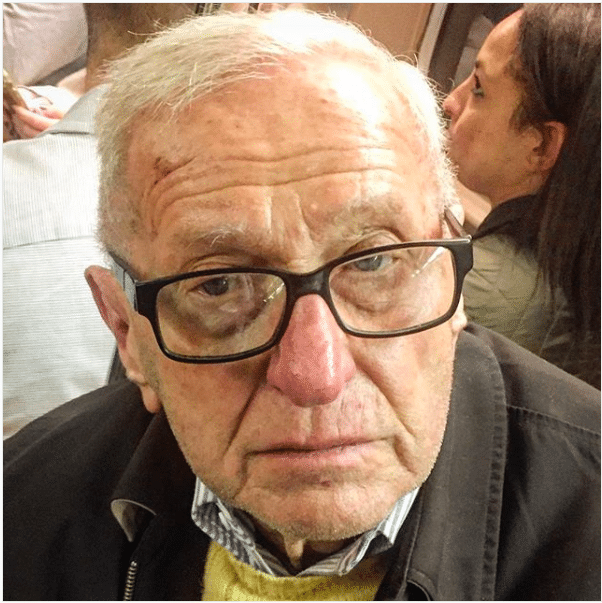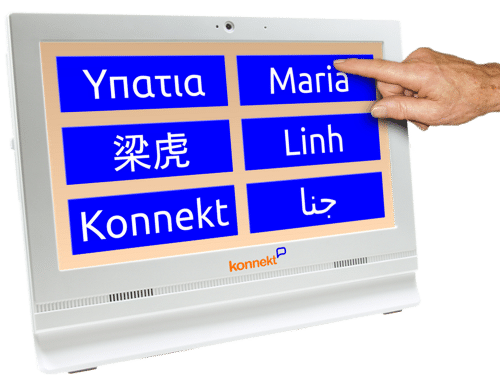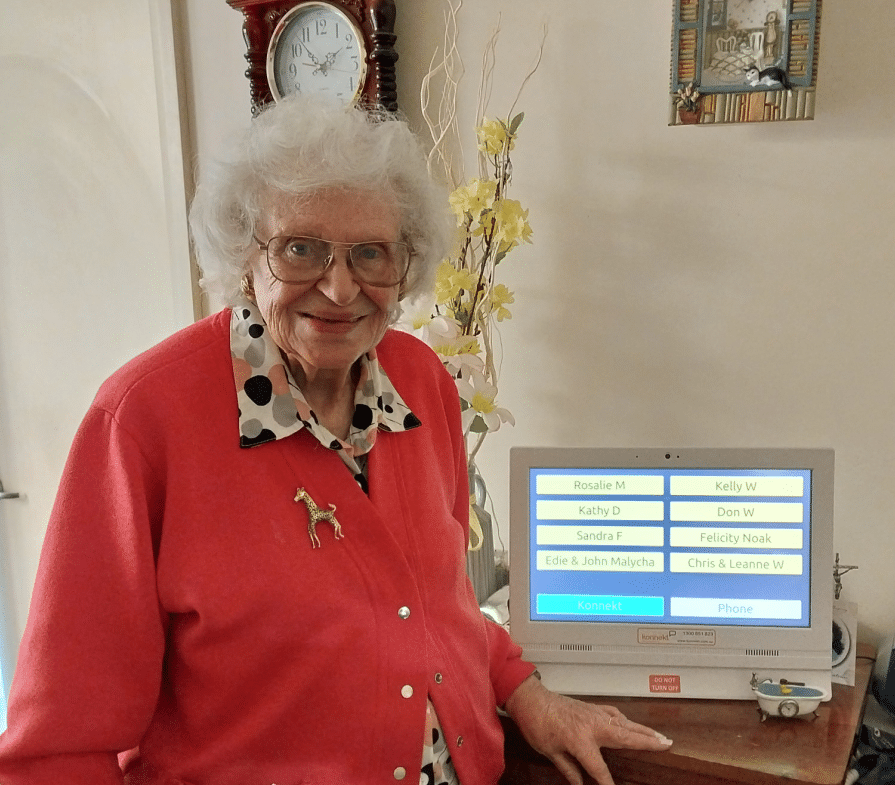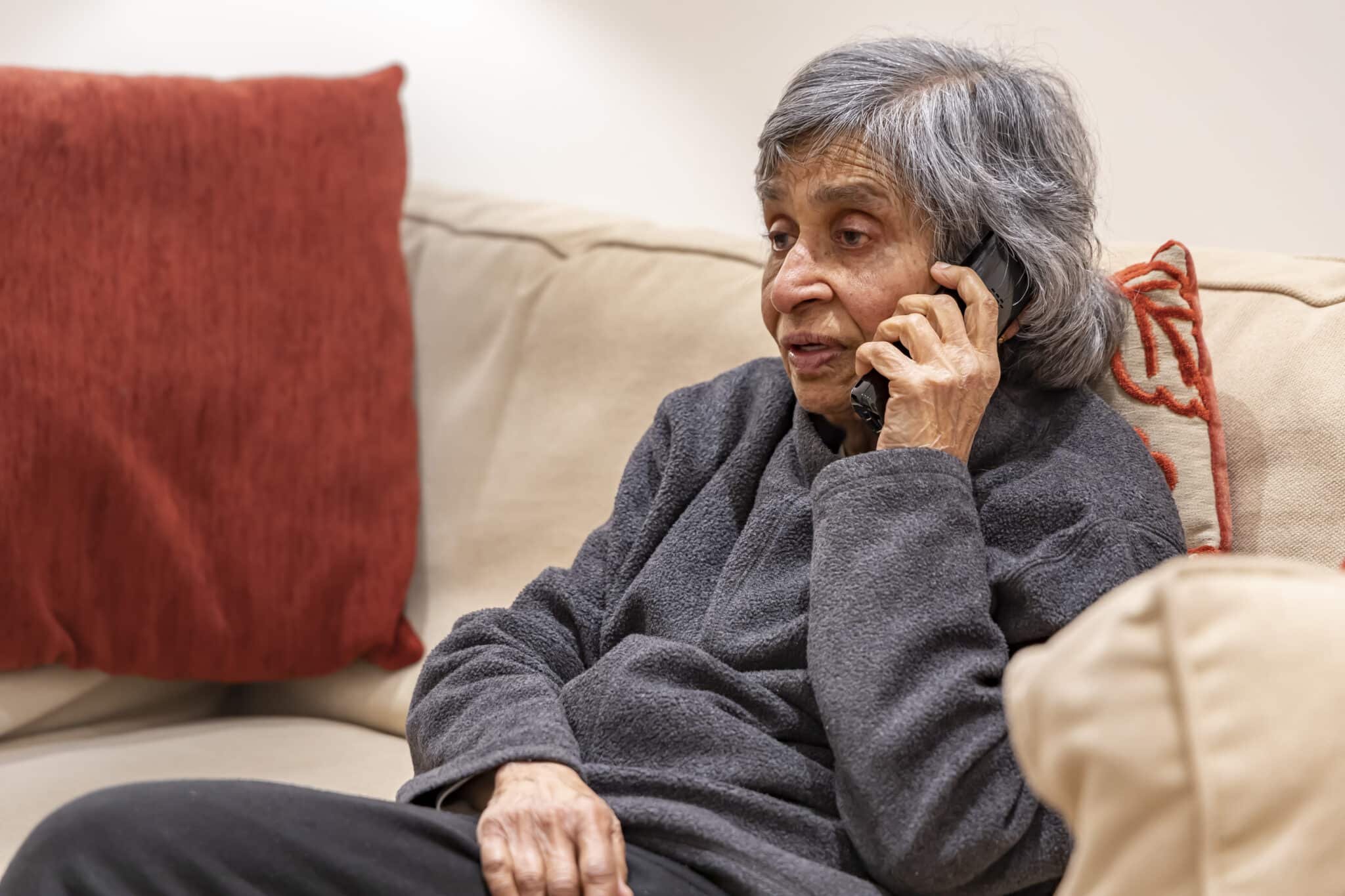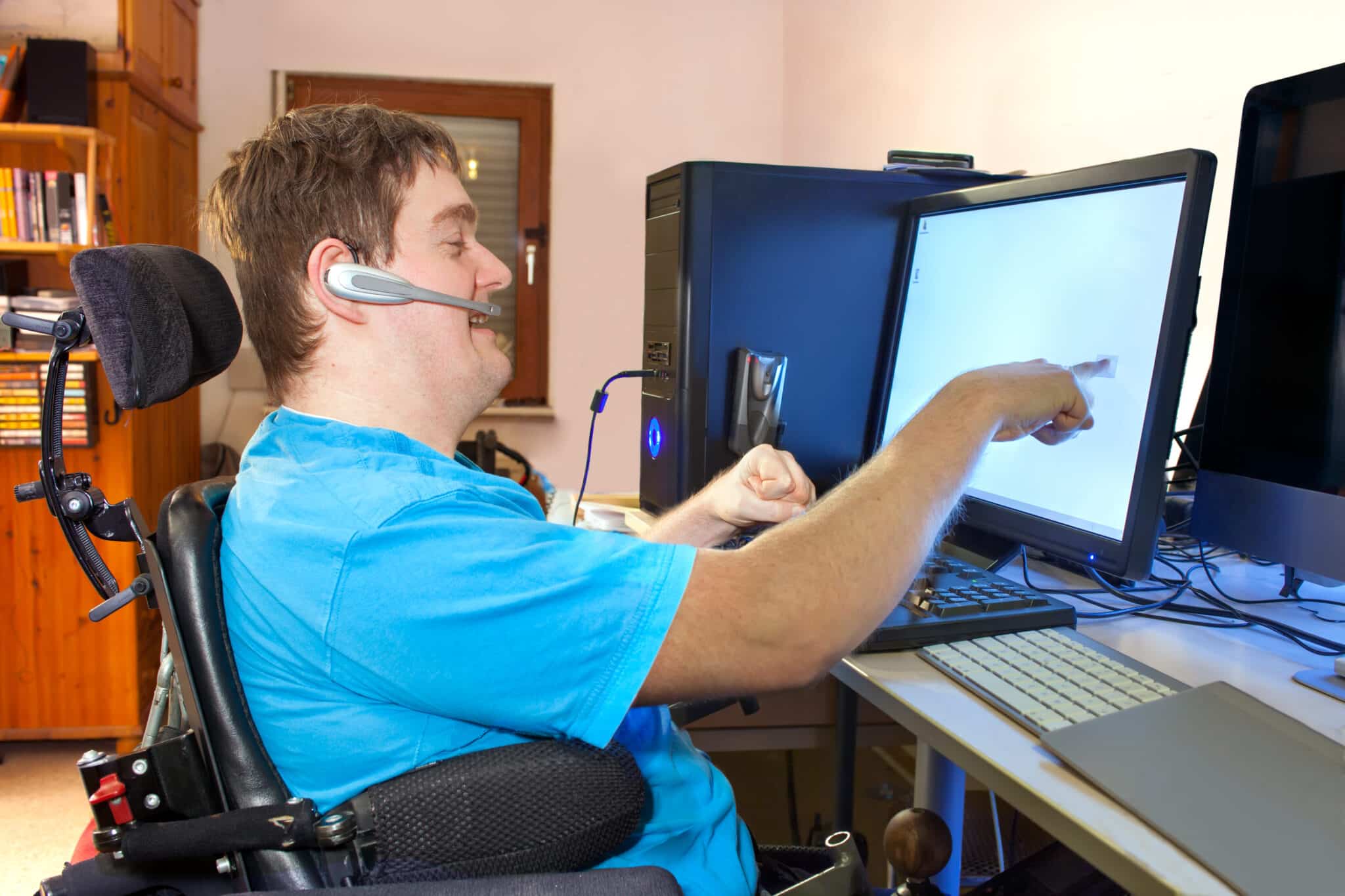Written by Karl Grimm, May 2019:
Videophone in the United Kingdom
Konnekt Videophone Helps Overcomes Disabilities, Reunites 3 Generations
Tony is an older adult living in the United Kingdom. Because he is partially sighted and has a memory impairment, Tony had little opportunity to see his family — particularly his overseas sons and grandchildren. The Konnekt Videophone keeps them connected visually, helps prevent loneliness and enables Tony’s sons to check on his condition.
We interviewed Tony’s son Ben:
Almost blind, partially paralyzed, severe memory loss
Struck with a cerebral virus the year that his son Ben was born, Tony was left partially paralyzed and with an almost non-existent short-term memory. Tony uses a tape recorder to help him remember things. In addition, he is registered in the UK as blind or only partially sighted.
Tony chooses to stay in his own home, where he lives alone. Remaining in his home is very important because of his poor memory. Placing him somewhere else would be extremely stressful and would likely take away his remaining independence: It would completely change the daily routines that he is able to remember.
Socially isolated
Paid carers visit Tony every afternoon to prepare dinner and help out. During winter, someone visits around noon to ensure that Tony has a hot lunch. Ben says that his father’s UK disability allowance helps cover the cost of the evening carer visits but not the lunchtime visits.
Social interaction is incredibly important for older adults, as shown by this University of Exeter Medical School study.
Tony doesn’t have much opportunity to connect with his family because most of his children and grandchildren live overseas in Australia and Thailand. A video-calling solution was desperately needed to allow the family to stay connected, keep in touch and check in on Tony. Unfortunately, using an app, remembering a procedure or finding instructions were practically impossible for Tony.
Tried a tablet first
About 8-10 years ago, Tony’s family gave him a computer that was connected through to the television and set up with PC-Anywhere software. This allowed Ben to control the computer remotely. It should have been straightforward but there were frequent problems… problems with the operating system and software updates, settings, the Internet, selection of the television input, and of course human error. Being remote made it difficult to troubleshoot, despite having the remote-control software installed on Tony’s PC.
Next, Tony was given an iPad tablet, which was easier for him to use. However, due to his very poor vision, Tony could only use it while someone else was there to help because Ben couldn’t turn it on remotely, the screen was too small (Tony could only make out the rough shape of faces) and Tony couldn’t use the tiny buttons.
Ben says that the Konnekt Videophone solved all of these problems: It’s BIG, it’s always on, and even after the first few months, Ben reported that they were using it for video calling far more than they ever used the iPad and the computer combined.
How Konnekt Videophone helped Tony in the UK
- “Videophone is BIG, always on. We used it more than the iPad and computer combined”.
- Much more convenient and easier to access for Tony to connect with family.
- Ben is in Australia and his brother is in Thailand. “Life is better now that Tony gets to see his family.”
- Tony’s family “wanted something that was just easy, and did not require having someone else at his home. Auto answer is extremely valuable.”
- Ben keeps an eye on his Dad, who has a bad leg. Ben can watch him walk to the phone and check his condition visually.
Enjoys seeing his grandchildren
Ben isn’t sure, but thinks that his father doesn’t feel lonely sitting at home on his own because of the unusual nature of his memory loss and capabilities. His short-term memory is very poor, but — unlike someone with dementia — Tony’s brain injury is fixed and stable. His capabilities are probably not becoming worse. Having the Videophone grants him the ability to see his sons, enables his sons to help with his care, but (most importantly), it allows Tony to see his grandchildren and vice versa.
Regular telephone challenges
Ben lamented that it’s very hard to find a suitable phone because these days, everything is small, compact and clever. Ben originally wanted a phone from the 1980s with big buttons and 4-5 programmed numbers. Memory 1 would call Ben, memory 2 would call Ben’s brother. That’s all.
More recently, Ben exclusively calls his Dad (not the other way around). Ben starts with a regular phone call to Tony’s landline telephone. This is part of the routine that Tony remembers. Ben calls his Dad and, after a quick hello, primes him for the video call. After hanging up the regular telephone, Ben calls Tony on his Videophone. The Videophone rings for a little while and then automatically answers. Tony is invariably still sitting on the sofa on other side of the room. He looks surprised every time and comes closer to the Videophone. The start of their conversation is the same each time.
What if Ben were to call his father first directly on the Videophone? Ben isn’t sure; he prefers to call Tony first on the telephone because Tony is used to the sound, the shape and position of the phone, and the procedure is familiar to him. After the regular call, Tony is not concerned about the Videophone ringing sound, the direction of the ringing, or the fact that the Videophone is on the other side of the room.
While this is unusual and seems unnecessary, it works well. Very well.
Visits from friends and relatives
In addition to the daily help from carers, Tony entertains visitors and has some outings. Once a month, he enjoys a trip to a local sports centre, where those with a disability can swim, play racquet ball and partake in other activities. Before his illness, Tony was an architect, and so one of his architect friends visits him occasionally for coffee. Tony’s sister lives just 40 minutes away, and Tony takes pleasure in a weekly shopping trip with her.
A simple video phone was needed
After trying the tablet first, Ben knew that his father needed something else, something very simple that didn’t require maintenance — especially after Ben’s move to Australia. Ben noted that his Dad’s sister, who lives in the UK, is completely non-technical and would be unable to assist; use of an iPad would be nearly impossible to explain to her (for example, the entry of an underscore character would be impossible for her). Ben wanted something that was very easy, and did not require someone to be there to support it. He was especially keen to have it working during the Christmas period.
Videophone’s auto-answer is “extremely valuable”.
Having the Videophone is critical because Ben and his immediate family, (including two children, now 4 and 6), are now in Australia and don’t get to go back as much as they’d like. Ben wants his kids to be able to see their Granddad and vice-versa. Videophone is the next best thing to being there.
Alternatives considered or tried
Years ago, Ben had a computer with a webcam at his Dad’s place, connected to the television, with the webcam fixed to the wall. However, Tony was required to turn it on and switch the TV to the correct input, and that was too hard.
During 2015 while he was in the UK, Ben tried his Dad with an iPad. It worked brilliantly while Ben was there. However, soon after Ben left, something went wrong and the iPad no longer worked. Tony’s sister (the remaining family member in the UK) was not at all tech-savvy and so was unable to help.
Favourite features
Ben said that there was no single favourite feature. These features of the Konnekt product and service are important to him:
- Having the screen on the wall, always on, so that there is nothing for Dad to misplace, knock over, switch on or recharge.
- Videophone can answer incoming calls from Ben and his brother, by itself.
- The reliability. Ben once had a problem with Tony’s British Telecom (BT) router. When Ben asked his Aunt to help, she could only tell him that the router had an orange light on. It took a month to sort out with BT, resulting in BT supplying a new router. Tony’s neighbour plugged in the new router and then Videophone worked straight away. The Videophone has been 100% reliable.
Improved quality of life
Ben said that his Dad seems much happier now because he has someone to see on the screen; it’s more than just a voice. He likes being able to see the family, and them being able to see him. The Videophone also lets Ben keep an eye on his Dad: Tony has a bad leg, but at the start of each call, Ben can watch his father walk to the phone and monitor his condition.
What would you say to someone who asked you whether they should get a videophone for their elderly parent?
I would definitely say they should. No point thinking about it, just go and get one.
Any suggestions for Konnekt?
Not really. Your support has been very good.
Konnekt Videophone for poor vision
- Large screen, 15 inch (38cm) – See the whole face in detail. Talk from anywhere in the room. Usable even when you forget your glasses.
- Large Buttons, 6 inch (15cm) – Huge text. Easy to hit.
- High Contrast Colours – A range of colour themes is available. Videophone is personalised to suit you.
- Auto-Answer – For those with extreme vision loss, Videophone can automatically answer trusted callers.
- Safety and emergencies – When there’s no answer, check whether they have fallen, fallen ill, or simply fallen asleep.
- Remote Health Check – Sons/daughters can see visual changes in their parent’s condition.
Find out more about Konnekt Videophone or contact Konnekt to learn about our Videophone.
Subscribe here to receive more hints and tips for carers.

